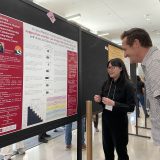Ground-Breaking Neuroscientist to Receive Chapman Honorary Degree
October 29, 2013
 Schmid College of Science and Technology is proud to host Elizabeth Gould, PhD, next month when she receives an honorary Doctor of Science from Chapman University.
Schmid College of Science and Technology is proud to host Elizabeth Gould, PhD, next month when she receives an honorary Doctor of Science from Chapman University.
Named one of the 50 most important women in science by Discover magazine, Gould is considered to be the world’s most prolific researcher in neuroplasticity. For the past two decades, her groundbreaking work has radically altered our ideas about brain function. Combining molecular biology, psychology and computational neuroscience, her work overturned convention by proving that the brain is not permanently fixed at birth or by adulthood, but that it changes in a variety of ways, including repairing damaged areas. Gould’s research epitomizes the power of scientific investigation that occurs at the intersection of multiple science disciplines.
Elizabeth Gould’s laboratory, The Gould Lab, focuses on understanding how experience shapes the adult brain and how structural plasticity leads to changes in brain function. Stress, deprivation and obesity have been shown to reduce structural plasticity in the hippocampus and a related brain region, the prefrontal cortex. By contrast, learning, enriched environment living and physical exercise have been shown to enhance structural plasticity. Evidence suggests that structural plasticity underlies the cognitive and anxiety regulation functions of these brain regions. Recent work in the Gould Laboratory implicates glial cells as important mediators of brain plasticity in adulthood.
Elizabeth Gould, PhD, is the Dorman T. Warren Professor of Psychology and the Neuroscience Institute at Princeton University. She received her PhD in Behavioral Neuroscience from UCLA and did her postdoctoral training at the Rockefeller University under the mentorship of Bruce McEwen. For the past two decades, Professor Gould has studied adult neurogenesis and other forms of structural plasticity. Her work focuses on the regulation of new neurons by experience, including stress, physical activity and parenting, findings that have implications for normal brain function and brain repair. As a result of her work on adult neurogenesis, Professor Gould was also awarded the NARSAD Distinguished Investigator award and the Royal Society of the Arts Benjamin Franklin Medal.
During her visit to Chapman University, Dr. Gould will give a free public lecture. We invite you to join us from noon to 1 p.m. on November 18th, 2013, in Argyros Forum 209A. Light refreshments will be served.
Like us on FaceBook!
Join us on LinkedIn!

